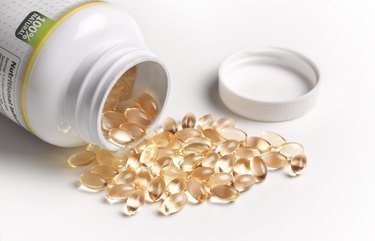
Adequate intake of vitamins, including vitamin D and the B complex group, are essential for good health. These nutrients are included together, along with other vitamins, in multivitamins. If you need to supplement your diet with vitamin pills, don't worry about combining vitamin D and B complex since toxicity is rare. Although some vitamins react with each other, vitamin D and B complex do not.
Tip
It's safe to consume vitamin D and the B complex together as a supplement or through food sources. However, if you're on medications or have a medical condition, consult your doctor about any drug interactions before taking supplements.
Video of the Day
Benefits of Vitamin D
Vitamin D plays an important role in your body, contributing to bone health, hormone regulation, normal cellular functioning, inflammation reduction and the synthesis of connective tissue.
Video of the Day
Dietary Guidelines recommends you get 600 IU of vitamin D daily. Foods that provide vitamin D are fatty fish, beef liver, egg yolks, cheese and fortified foods, such as cereals, milk and orange juice. However, sun exposure is the best source of vitamin D.
Vitamin D Deficiency
Certain conditions may cause you to be deficient in vitamin D. The National Institutes of Health states that those most at risk are older adults and others who get limited exposure to sunshine, those with dark skin, people who have obesity, people with medical conditions that cause fat malabsorption and patients who have undergone bypass surgery.
You may need a supplement containing vitamin D if you experience symptoms of a deficiency including bone pain, easily fractured bones, stooped posture, muscle cramps, fatigue, weakness, tingling and depression or anxiety. Your doctor should perform blood tests to check your level of vitamin D.
What is B-Complex?
The B-complex group is composed of all the water-soluble vitamins, except vitamin C. These include thiamin (B1), riboflavin (B2), niacin (B3), pantothenic acid (B5), pyridoxine (B6), biotin, folic acid and the cobalamins (B12). Each has a different function. For example, you need vitamins B1, B2, B3 and biotin for energy; vitamin B6 for amino acid metabolism; and vitamin B12 and folic acid for cell division, says Michigan Medicine.
Deficiency in B Vitamins
Each member of the B-vitamin group has a different recommended daily intake. A poor diet, age, genetics, being a vegan, medical conditions, some medications and alcohol abuse can increase the body's requirement for B vitamins, says the Colorado State University Extension.
If you have a deficiency, it's likely that one of the B vitamins is causing symptoms. Signs of low vitamin B depend on which of the B vitamins you lack. A deficiency can result in a range of negative effects, from fatigue, confusion, a compromised immune system and skin rashes to anemia.
The different types of vitamin B come from different food sources. For example, vitamin B12 is primarily found in animal products, such as meat and dairy. Fruits and vegetables offer vitamins B7, B9, B1 and B2. If you eat a balanced diet that includes fish, poultry, meat, eggs, dairy, leafy green vegetables and legumes, along with fortified cereals and bread, you'll likely meet your daily requirements for all B vitamins.
Toxicity and Drug Interactions
Since the vitamins in B complex are water soluble, any excess from supplements is excreted with your urine, making toxic effects unlikely. However, megadoses of vitamin D from supplements can cause toxicity, resulting in a buildup of calcium in your blood, known as hypercalcemia. Symptoms may be mild — from nausea, vomiting, weakness and frequent urination to more serious consequences, such as bone pain and kidney problems, says Mayo Clinic.
Always get advice from your doctor before taking vitamin D or B complex, especially if you're taking medications for any medical conditions. Drugs.com warns that 11 drugs are known to interact with vitamin B complex multivitamins. The two drugs that can cause the most serious interactions are capecitabine, and fluorouracil, which are both used to treat cancer.
Certain medications may also interfere with your ability to absorb vitamin D, including some barbiturates and anti-seizure drugs.
- MedlinePlus: B Vitamins
- National Institutes of Health: Vitamin D
- Dietary Guidelines 2015: Nutritional Goals for Age-Sex Groups Based on Dietary Reference Intakes and Dietary Guidelines Recommendations
- University Health News: 10 Vitamin D Deficiency Symptoms You Can Identify Yourself
- Michigan Medicine: Vitamin B-Complex
- Healthline: The Symptoms of Vitamin B Deficiency
- Mercola: What Are the Signs of Vitamin B Complex Deficiency?
- Drugs.com: Medications Known to Interact With Vitamin B Complex
- Mayo Clinic: What is Vitamin D Toxicity, and Should I Worry About it Since I Take Supplements?